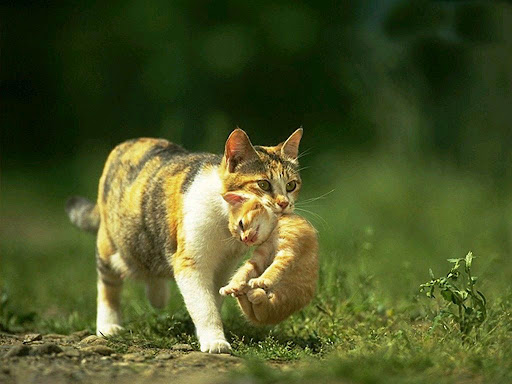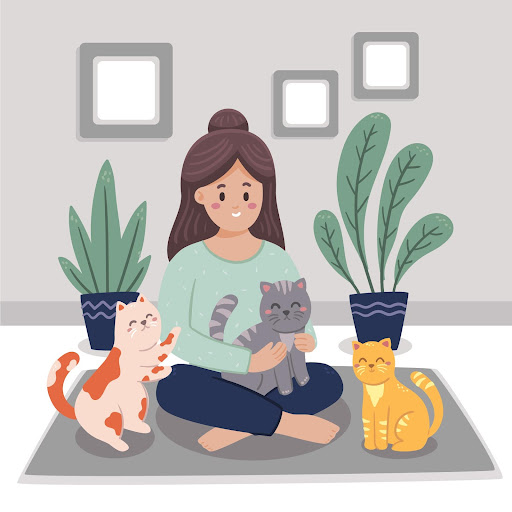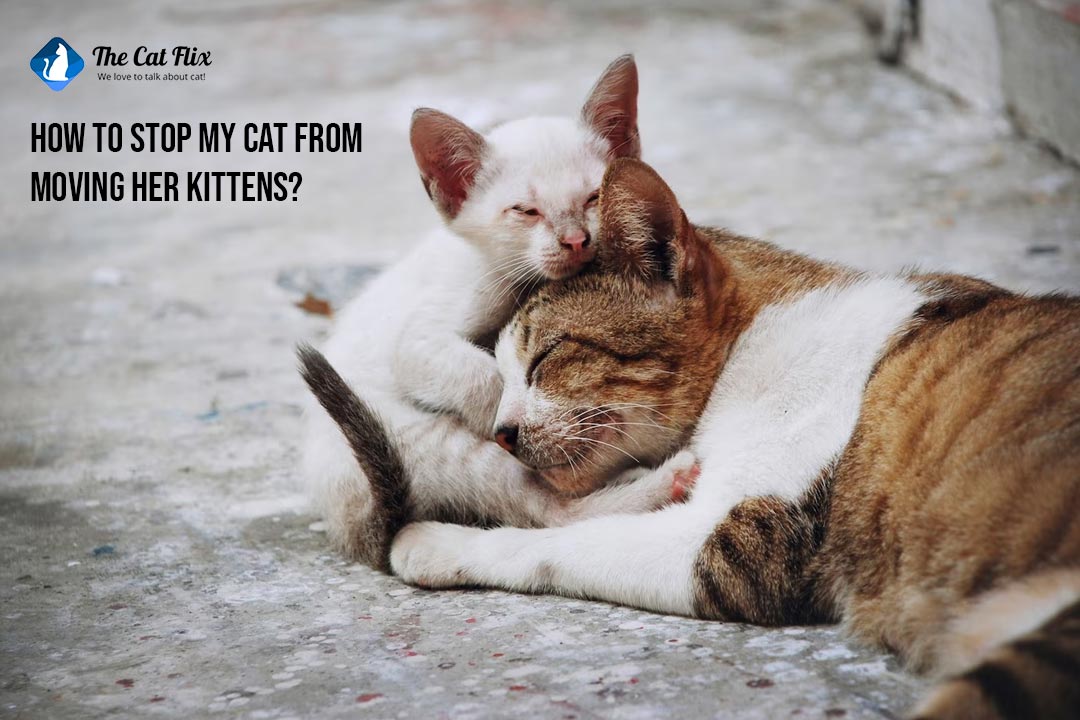Hey there, fellow cat lovers! Remember our previous chats, where we’ve explored how to tell if your cat is expecting?(if not go ahead and have lil’ peak)
Well, as cat parents, we’re always on our toes, right? Also, we’re all too familiar with the roller-coaster emotions during their pregnancy, like getting all lovey-dovey or switching to solitary moods.
But do you know after giving birth, her emotions can run even higher like she gets more sensitive than before. Even if your cat has already given birth, you must have noticed she’s trying to move her kittens.
There are several reasons behind it, along with that, it’s also a bit concerning for us.
As a cat parent, I understand how you feel. Like always, Catflix is here to give you some insights on why Mama Cat has this sudden urge to move her kittens, and, more importantly, how you can stop her from it. So, let’s continue, then.
Is it Normal For Mother Cats to Move Their Kittens?
Some of the habits of a new mother cat may leave us scratching our heads, especially when she decides to relocate her kittens after a certain period.
Don’t worry, this is a normal and natural instinct in cats and usually not a sign of trouble.

Most mother cats will begin to relocate their kittens around 2 weeks of age. But not all cats will do that in their newborns’ first few days.
Now, here’s the scoop on why they do this. Newborn kittens are about as helpless as can be. When they are born, they are usually blind and deaf, unable to even open their eyes or ears. Mama cat knows this and keeps her babies close in these early days.
As long as mama feels comfy in her surroundings, she’ll let her kittens be for those first crucial 12-14 days. By the age of 2 weeks or more, those little kittens gain the power of sight and hearing, which makes mama cat feel a bit more at ease with the idea of relocating her babies.
Sometimes, she may move her kittens even earlier than 2 weeks, such as when she is stressed, disturbed, or unhappy with her current location.
This is rare, but it can happen that a momma cat moves her kitten at 1 week old. If that happens, check what’s bothering her or making her feel unsafe.
In some cases, mother cats leave their kittens periodically. Find out if it is normal for mother cats to do that from this free video clip of a veterinarian.[click here]
Why Does Cat Keep Moving Her Kittens
“Why do cats move their kittens?” is a question we all cat owners want to know. In the previous section we learned moving kittens is normal for mother cats.
Though it’s a bit concerning for us. So, before we delve into solutions, it’s essential to understand the reasons behind it.

Cats Are Natural Nest Movers
Firstly, cats are nest movers by nature. This behavior is deeply rooted in their survival instincts. In the wild, if mother cats feel threatened, they move their kittens to different places.
Your domestic cat still carries this instinct, which can lead to her moving her kittens even if they are already in a safe and comfortable location.
Seeking for Safe Haven
Mama cat moves her kittens to keep them safe and private. She doesn’t want to feed her babies in front of her human family, so she finds a quiet spot. You may even see that she’s moving her kittens under your bed.
She might also hide from the kittens’ father, as every female cat needs at least 6 weeks to recover before entering heat again after giving birth while male one doesn’t.
Furthermore, she also protects her kittens from other cats or pets in the household.
Cats’ lives are usually scary, and for just born kittens, it’s become double scarier as they are quite vulnerable. Mama cats move them to protect them from predators like brush wolves(coyotes).
Uncomfortable Environment
A cat may also move her kittens if she finds the environment too bright, noisy, dirty, or cold for them.
Too much brightness is a no-go for mama cat and her kittens. Cats prefer dim surroundings, and kittens are even more sensitive to light. Also Noisy environment can become uncomfortable for mom cats and make her kittens relocate.
Do you know after giving birth, cats become more pickier about their surroundings? If it’s dusty, dirty, or grimy, they’ll move elsewhere.
Kittens need warmth, even more than adult cats. They need 25°C to 30°C (80-85 °F) temperature until six to eight weeks of age. This temperature can be lowered gradually as they grow older.
Sick Kitten In Litters
Sometimes, you may notice that your cat only keeps moving one of her kittens. When a kitten falls ill, it can trigger your cat’s instinct to relocate her kittens.
As a protective parent, if one of her kittens shows signs of illness or weakness, the mother cat might move all healthy ones but one kitten to ensure others safety.
Too Much Human Contact!
Final reason for moving kittens is they are getting too much human interaction. Believe it or not, cats can be quite particular about their personal space, especially when they have kittens to care for.
If there’s been an excess of human contact with the kittens, mama cat might decide it’s time for a move. So, should you let your cat move her kittens? I think you should. [read -> should cats have free reign of house]
How to Prevent Your Cat From Moving Her Kittens
Now that we’ve explored the reasons behind this behavior, let’s discuss practical steps to stop your cat from moving her kittens.

Keep The Nest Area Quiet
When your cat is expecting, think about where she’d like her cozy space. Most cats prefer quiet, dimly lit areas with fewer people around. While she might pick a spot herself, you can gently guide her to a better location that suits both of you.
It can happen that cats keep moving kittens to unsafe places. If she chooses inconvenient spots, don’t move her nest. Instead, make that area as peaceful as possible.
Keep other pets away, and you can even create a snug space by placing her nest inside a big crate or adding blankets for extra privacy and warmth.
Make Sure Nest Is Warm and Cozy
Newborn kittens can’t control their body heat, so they need a warm place. Make sure there are no cold drafts in the area where mama cat made her nest.
Keep doors and windows closed, and you can even use a thermometer to check and maintain the room temperature. This will help keep the kittens cozy and happy.
Clean The Nest Everyday
As part of your daily routine, it’s important to maintain a clean environment for mama cat and her kittens. Male sure to take away any dirty blankets or bedding, clean the litter box well, and remove spilled food.
Regular cleaning keeps the area tidy and comfy, which makes mama cat more likely to stay with her kittens without relocating.
Limit Your Interaction With Kittens
Resist the urge to constantly handle the cute kittens. Mama cat’s got it under control! As long as she has a clean nest, food, water, and a litter box nearby, she’s good to go.
Handling the kittens too much can stress out mama cat and confuse her scent. Wait until the kittens are around 3 to 4 weeks old before letting people visit. This way, mama cat will be more relaxed about it as the kittens start exploring on their own.
Regular Check-Ins The Health of Mother Cat and Kittens
Mama cat can be quite intuitive. If she moves just one kitten from the nest instead of all, or the opposite, she senses something’s off with that particular kitten.
If you’re worried about your cat or her kittens’ health, it’s smart to call the vet. They might chat with you over the phone or want to check on mama cat and the kittens in person.
Mama cats can get sick too. Things like mastitis (painful mammary gland infection), hypocalcemia (caused by low calcium), or uterine metritis (a uterus infection) can make her move the kittens.
In these cases, she’ll need veterinary care to get better, and the kittens might need bottle-feeding while she recovers.
[read -> How to bottle feed a kitten]
When Should You Consult a Veterinarian
If your cat continues to exhibit signs of distress or insists on relocating her kittens despite your efforts, or showing issues like mastitis, low calcium, or a uterus infection, consult your veterinarian.
There may be underlying health issues or stressors that need professional attention.
What to Do If Your Cat Has Already Moved Her Kittens
If she already moved her kittens, then you can do few steps which are given below-

Locate the Kittens
If your cat has already moved her kittens, carefully search for them to ensure they are safe and together.
Return Them to the Nest
Gently return the kittens to the original nesting spot if possible. Be cautious and avoid interfering too much to prevent further stress.
Monitor Carefully
Keep a close eye on the mother cat and her kittens to ensure they are settling in the designated area.
Wrap Up
Understanding your cat’s instincts and providing a secure environment is key to preventing her from relocating her kittens.
By following the steps outlined in this guide, you can ensure the safety and well-being of both your cat and her precious little ones. Remember, a comfortable and stress-free environment will help your feline family thrive.
Now it’s your turn. Share your valuable insights and opinions with us in the comments. And if you have any question about this topic or other feel free to ask.

